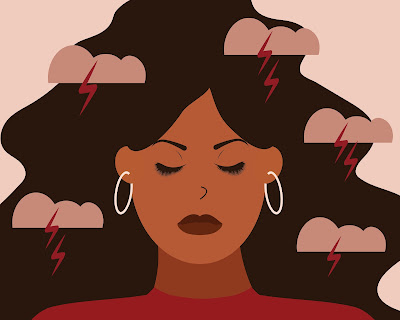Loneliness is not defined by how many people you have in your life. You can have hundreds of people in your life, but if your connections with them aren't deep and authentic and if these connections aren't meaningful to you, you will experience loneliness.
Loneliness is a subjective feeling. It's usually defined by the gap between the social connections you wish you had compared to what you actually have.
Loneliness isn't about being physically alone. It's a feeling--not a physical state. It doesn't matter how many people are around you, if your connections are shallow, you will probably feel lonely.
Clients often describe their sense of loneliness as feeling emotionally disconnected from others and, in some cases, feeling misunderstood.
What Causes Loneliness?
Loneliness can be caused by many internal and external factors including:
Internal Factors:
- Mental Health Conditions: Depression, anxiety (including social anxiety),a low sense of self worth and other mental health conditions can make it difficult to develop and maintain relationships.
- Past Unresolved Trauma: Unresolved trauma where your trust was violated can make it difficult to trust people.
- Personality: For some people, personality is a factor. For instance, people who are very introverted might find it difficult to form and sustain friendships.
External Factors:
- Loss: The death of a loved one, divorce, a breakup or other types of loss can create a sense of loneliness (see my article: Coping With the Loss of a Loved One).
- Life Changes: Moving to a new area, retirement, starting a new job or school or becoming a new parent can disrupt social networks (see my article: Being Open to New Experiences).
- Social Isolation: Living alone in a remote area, having a disability that impacts mobility and the ability to have social interaction as well as other circumstances, can have a big impact on loneliness.
- Economic Factors: Financial struggles can make it difficult to participate in social activities.
- Cultural and Societal Pressures: An overreliance on technology instead of having more direct human contact, career stress and discrimination often contribute to loneliness.
What is the Difference Between Loneliness and Solitude?
There are fundamental differences between loneliness and solitude (see my article: What's the Difference Between Loneliness and Solitude?).
- Loneliness: As previously mentioned, loneliness involves wanting to have deeper connections with people but not having them. It can also involve an involuntary separation from meaningful relationships.
- Solitude: Solitude is a voluntary state where people are alone but they enjoy their time alone. They continue to have social relationships with others that they can return to when they want to reconnect with them. Their time alone can be balanced with their time with others.
How to Prevent or Overcome Loneliness
Overcoming loneliness requires making a conscious effort to make a change in your life.
Here are some suggestions that might work for you:
- Be aware that everyone experiences loneliness at some point, but it you feeling lonely most of the time, it's an indication that you need to make a change in your life (see my article: Developing the Internal Motivation to Change).
- Understand the impact that loneliness is having on your health, mental health and overall well-being.
- Talk to someone in your life you can trust--a family member, friend or someone else you consider trustworthy.
- Get involved in community service or an activity you enjoy where you can connect with others in a meaningful way.
- Anticipate the best from people instead of expecting to be rejected.
- Focus on developing quality friendships with people who have similar attitudes, interests and values.
- Strengthen existing connections. While it's important to develop new connections, it's also important to strengthen current connections. Maybe there's a friend or family member you haven't spoken to in a while. Reach out to them.
Get Help in Therapy
Therapy can help you to overcome loneliness.
Therapy provides a supportive environment to understand the root causes of loneliness including how mental health issues, coping skills, social skills, negative beliefs and prior traumatic experiences among other issues might be getting in your way.
Therapy can also help you to set and follow through on goals to overcome loneliness and deal with internal blocks which might be unconscious (see my article: Overcoming Emotional Blocks).
Rather than struggling on your own, contact a licensed mental health professional to develop a more meaningful life with deeper connections.
About Me
I am a licensed New York psychotherapist, hypnotherapist, EMDR, AEDP, Parts Work Therapy (IFS and Ego States Therapy), Somatic Experiencing and a Certified Sex Therapist.
I have helped many individual adults and couples to overcome loneliness.
To find out more about me, visit my website: Josephine Ferraro, LCSW -NYC Psychotherapist.
To set up a consultation, call me at (917) 742-2624 during business hours or email me.
Also See My Articles:



















.jpg)











.jpg)












